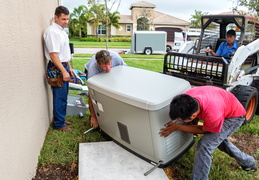Thinking about investing in a whole-home generator? Smart move. A generator isn’t just a luxury—it’s peace of mind. Power outages can happen anytime, and having a reliable backup system keeps your family safe and your home running smoothly. At JN Electrical, we know how confusing the process can be, especially for first-time buyers. For reliable generator installation in Hart County, JN Electrical is your go-to partner. That’s why we’ve created this step-by-step checklist to help you prepare for your generator installation with confidence.
1. Evaluate Your Home’s Power Needs
Before you buy anything, take inventory of what you want to keep running during an outage. Is it just the fridge and lights, or your entire HVAC system, well pump, and security system too? Our team can help you calculate the wattage your home needs, so you don’t end up with a generator that’s too small or far more than you need.
2. Choose the Right Generator Type
There are standby generators (permanently installed and automatic) and portable ones (for temporary use and manual setup). For whole-home coverage, a standby generator is the clear winner. It kicks in automatically during an outage and powers your home seamlessly. No scrambling for extension cords or gasoline.
3. Check Local Codes and Permits
Generator installation isn’t just plug-and-play. Hart County has specific zoning requirements, noise ordinances, and electrical codes. We handle all of that for you. From permit applications to code-compliant installs, our licensed electricians ensure everything is done by the book.
4. Pick a Location for the Generator
Your generator must be placed safely, usually outside, at least five feet away from windows, doors, and vents, and sitting on a concrete pad. We’ll help you select a location that meets safety codes and maximizes performance, without disrupting the aesthetics of your property.
5. Prepare for Fuel Source and Access
Most whole-home generators run on natural gas or propane. If you’re in a rural area of Hart County and don’t have access to natural gas, propane is a reliable alternative. We’ll review your fuel setup, coordinate with your supplier if needed, and make sure everything is up to spec.
6. Plan for Routine Maintenance
Even the best generators need regular maintenance. We offer service plans that include oil changes, inspections, and load testing to keep your system running at peak performance, so it’s ready when you need it most.
7. Work With a Trusted Installer
Not all electricians are created equal. When it comes to something as important as backup power, you want trained professionals with real experience. We walk you through every step and handle the technical details so you don’t have to.
8. Understand Your Warranty
Whole-home generators come with manufacturer warranties, but correct installation is key to keeping them valid. We register your unit and ensure it’s installed according to the manufacturer’s standards. That way, your investment is protected for years to come.
At JN Electrical, we’re committed to making your generator installation simple, stress-free, and built to last.


